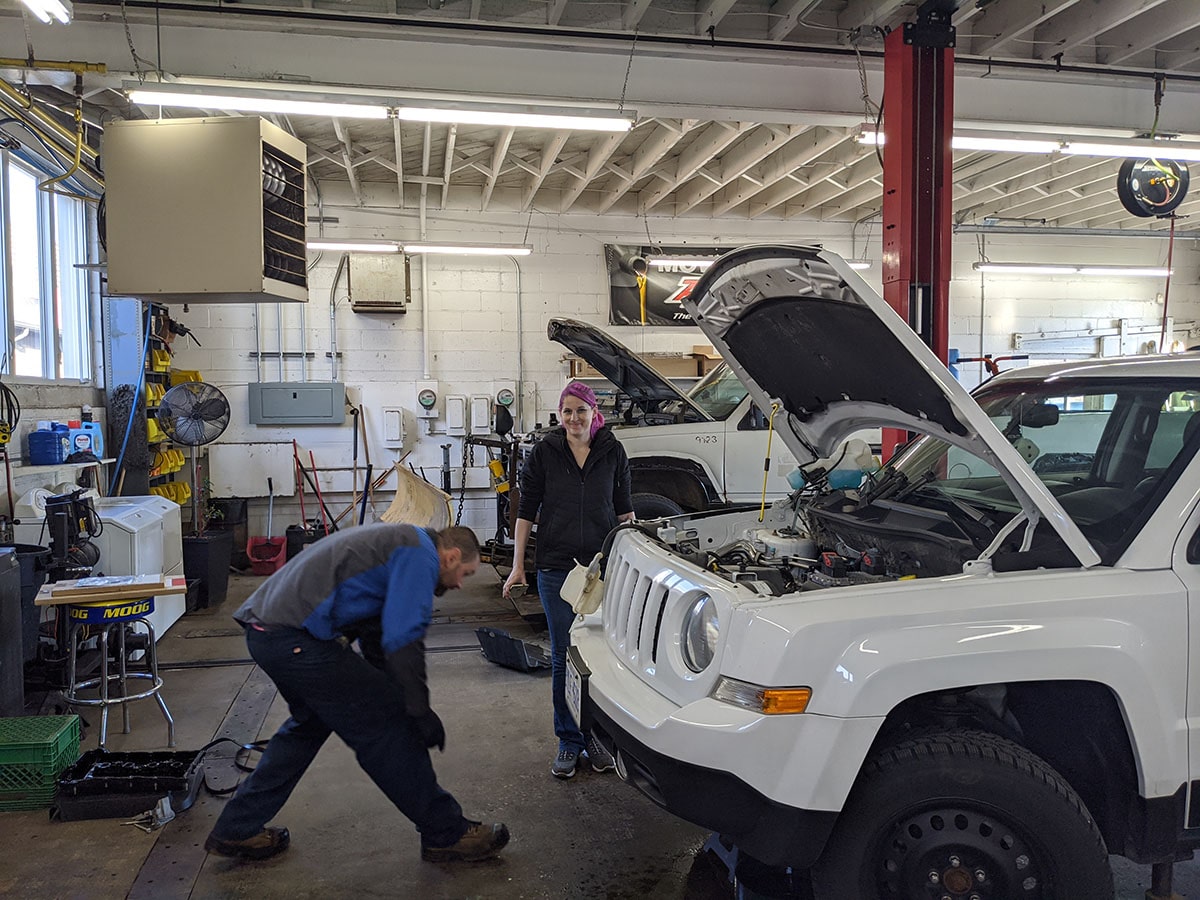The Importance of Regular Oil Changes
Motor oil is the lifeblood of your vehicle’s engine, providing lubrication, cooling, and cleaning properties. Over time, however, oil can become contaminated with dirt, debris, and engine byproducts such as moisture. Contaminated oil has degraded lubrication and detergent effectiveness and will potentially contribute to engine damage.
Regular oil change is the heart of any effective long-term maintenance and service strategy. Regular service presents a licensed mechanic with an opportunity to inspect your car to find any little problems before they become big, expensive problems. It is also important to have essential fluids and fluid filters changed regularly to maintain engine health and prevent damage.

What Happens During an Oil Change at The Auto Station?
1: Vehicle Check-In & Consultation: We'll confirm your vehicle details and discuss your driving habits to recommend the best oil for your needs.
2: Old Oil Drain & Filter Removal: Our certified technicians safely drain used oil and remove the old oil filter.
3: New Oil Filter Installation: We install a high-quality, manufacturer-recommended oil filter.
4: Fresh Oil Fill: Your engine receives the precise amount of premium conventional, synthetic blend, or full synthetic oil, based on your vehicle's specifications.
5: Complimentary Multi-Point Digital Inspection: While we're working, we'll perform an inspection, checking fluid levels, tire pressure, belts, hoses, and more. You'll receive a detailed Digital Vehicle Inspection (DVI) report with photos.
6: Fluid Top-Offs & Tire Pressure Check: We'll top off essential fluids (windshield washer, power steering, etc.) and check that your tires are at optimal pressure."
7: Service Reminder & Next Steps: We'll affix a service reminder sticker and discuss any findings from our inspection, advising on future maintenance.
How Often Should You Change Your Oil?
How often you need an oil change depends on factors such as vehicle age and condition, driving habits, and the type of oil used.
Your vehicle owner's manual should detail the recommended interval, but here are some general guidelines:
Every 3-4 Months
(4,000-6,000 km)
You will need more frequent oil changes if:
⇒ You're driving a car that has a turbo charged engine. Turbo charged engines demand shorter oil change intervals due to the extra stress they place on the oil. The turbo increases engine heat and pressure causing the oil to break down faster. And, the turbo itself relies on engine oil for cooling and lubrication exposing the oil to even higher temperatures. Regular oil changes are crucial to prevent engine wear and ensure the turbo charger runs smoothly.
⇒ You operate your vehicle under more stressful conditions — extreme temperatures, rough roads, heavy stop-and-go traffic, and/or heavy loads in tow.
Every 6 months
(6,000-8,000 km)
⇒ The recommended oil service schedule for most newer vehicles are extended for a variety of reasons based on normal driving conditions. At the Auto Station we believe that regular oil change intervals at 8K or less produces exceptionally long lasting engine life and really helps to keep engine repair cost down.
⇒ Canadian cold weather engine starts produce moisture that is captured in the crank case. Short driving time often does not produce the temperature to drive the mositure from the engine system. This moisture is the leading cause of oil breakdown and related engine lubrication failure.
⇒ Represents the range of most synthetic oil in the Canadian climate.
⇒ Use of a dipstick to check oil level and oil quality is part of regular car maintenance
Up to a year
(8,000-20,000 km)
⇒ Newer car models regularly suggest longer oil change intervals to promote more cost effective operation costs. We believe these intervals to be limited to highway drivers with typical distances exceeding 100 km or 1 hour of operating time per start.
⇒ We offer only premium extended-life synthetic oil installed with a high quality extended life oil filter in this application
⇒ Pay attention to your vehicle's built-in oil life monitor (if present) as "a not to exceed" recommendation.
⇒ Check oil level with dipstick monthly for both volume and appearance
Why does my dealer recommend oil changes every 15K, and you say half that?
Manufacturer Marketing and warranty concerns mean keeping your repair costs low while your car is under warranty. We expect the cost of operating your car for the last 50K of its service life to be the same as the first 50 K.
Manufacturers often recommend longer intervals to reduce the perceived cost of maintenance, which can make their cars more attractive to potential buyers. They set these intervals conservatively based on typical driving conditions and the performance of modern oils and engines. These recommendations are also designed to minimize maintenance while ensuring the vehicle lasts through its warranty period.
We believe that the best way to keep your car costs down is to make your vehicle last longer. A regular oil change interval of 8K does that.
Is Your Car Telling You It Needs an Oil Change?
Even if you meticulously follow your vehicle's recommended service schedule, your car might be trying to tell you it's time for fresh oil sooner than expected. Ignoring these warning signs can lead to decreased performance, reduced fuel efficiency, and eventually, costly engine damage. Pay attention to these common indicators that it might be time to visit The Auto Station for an oil change:
|
Dark and Gritty Oil |
This is often the most straightforward sign. To check, warm up your engine for a few minutes, then turn it off. Pull out your oil dipstick, wipe it clean, reinsert it fully, and then pull it out again. Fresh oil is typically translucent and amber-colored. If the oil on your dipstick appears dark black, opaque, or feels gritty between your fingers, it's laden with contaminants and has lost its lubricating effectiveness. |
| Loud Engine Noises (Knocking or Grinding) |
Motor oil's primary job is to lubricate moving parts and reduce friction. When oil breaks down or its level is too low, the engine's components will experience increased metal-on-metal contact. This can result in audible knocking, grinding, or a general increase in engine noise, particularly a ticking sound from the valvetrain. |
| Illuminated Oil Pressure Light or Check Engine Light |
Most vehicles are equipped with sensors to monitor oil pressure and other engine parameters. If your dashboard's "Oil Pressure" warning light illuminates (often shaped like an old oil can), it's a critical alert that your engine is experiencing dangerously low oil pressure or that the oil level is very low. In some cases, a general "Check Engine" light might also come on due to oil-related issues. When these lights appear, it's crucial to have your vehicle inspected immediately. |
| Decreased Fuel Economy |
Dirty or old oil forces your engine to work harder. The increased friction and resistance mean your engine needs more energy (and thus more fuel) to perform the same amount of work. If you notice your car isn't getting the mileage it used to on your daily commutes around Burlington, a simple oil change could be the solution to restoring its efficiency. |
| Excessive Exhaust Smoke |
While a small amount of clear vapor from your exhaust is normal, visible smoke (especially blue or grey) can indicate that oil is burning inside the engine. This can be caused by severely degraded oil, worn engine components, or excessive sludge preventing proper lubrication. If you see persistent smoke from your tailpipe, it's a strong sign your engine needs immediate attention and likely an oil change. |
5 Benefits of Regular Oil Changes
1. Engine Lubrication
Clean oil reduces friction between moving engine parts, preventing excessive wear and tear. Adequate lubrication ensures that the engine runs smoothly and efficiently, minimizing the risk of costly repairs. At The Auto Station in Burlington, ON, we prioritize using high-quality oils that meet or exceed industry standards, providing the best lubrication for your engine.
2. Engine Cooling
Engine oil helps dissipate heat generated by the engine's internal combustion process. Fresh oil carries heat away from critical engine components, preventing overheating and potential engine failure. Our services ensure that your engine stays cool and operates at optimal temperatures.


3. Engine Cleaning
Over time, oil can accumulate sludge and deposits that can clog vital engine passages. Regular oil changes flush out these contaminants, keeping the engine clean and promoting optimal performance. Our technicians perform thorough oil changes to ensure that your engine stays clean and free from harmful deposits.
4. Fuel Efficiency
Clean oil reduces internal friction, allowing the engine to operate more efficiently. Improved efficiency translates to better fuel economy, saving you money at the pump. At The Auto Station, we understand the importance of fuel efficiency, and our oil change service helps maximize your vehicle's fuel economy.
5. Extended Engine Life
By providing proper lubrication and protection, regular oil changes can significantly extend the lifespan of your engine. Investing in routine maintenance at The Auto Station can help you avoid costly engine repairs or premature engine failure. Our expert technicians ensure that your engine receives the care it needs to keep running smoothly for years to come.
Oil Change Cost Factors
Types of Oil Changes
- Conventional: Made from refined crude oil; the most affordable option suitable for older cars with simpler engine designs.
- Synthetic blend: A good value pick for many vehicles; better protection than conventional oils at a lower cost than a full synthetic.
- Full synthetic: Specially engineered for longevity and performance; the costliest option, sometimes mandatory for premium models.
- High-mileage: Formulated with special additives to give more experienced engines the extra TLC they need.
Engine Oil Capacity
Larger vehicles — and by extension larger engines —require more oil to lubricate.
Oil Filter
While not pricey on its own, the type of oil filter specified for your vehicle will have a slight influence on the final cost.
How Much Will I Pay for an Oil Change?
Conventional
⇒$50 to $80 CAD
Synthetic Blend
⇒$60 to $90 CAD
Full Synthetic
⇒$80 to $120 CAD
High-Mileage
⇒$60 to $100 CAD
Value of an Oil Change at the Auto Station
Scheduled maintenance tasks like oil changes are a good opportunity to check in on the general well-being of your vehicle! Our team is always available to answer any questions you may have about your vehicle or the oil change process.
Complimentary with every service visit at The Auto Station, you'll get a status report on all your car or truck's vital systems, so we can catch little problems before they become big ones!
What Our Customers Are Saying
Oil Change FAQ
Do you use a specific brand of oil, or can I request a particular brand for my oil change?
We use only high-quality oils that meet or exceed the manufacturer's specifications for your vehicle. If you have a preferred brand or a specific oil requirement, just let us know when booking your appointment. We're happy to accommodate special requests whenever possible!
How long does a typical oil change take at The Auto Station?
Do you check other fluids and perform a general inspection during an oil change?
Can you perform oil changes on European, luxury, or high-performance vehicles?
What should I do if I notice my oil level is low between changes?

